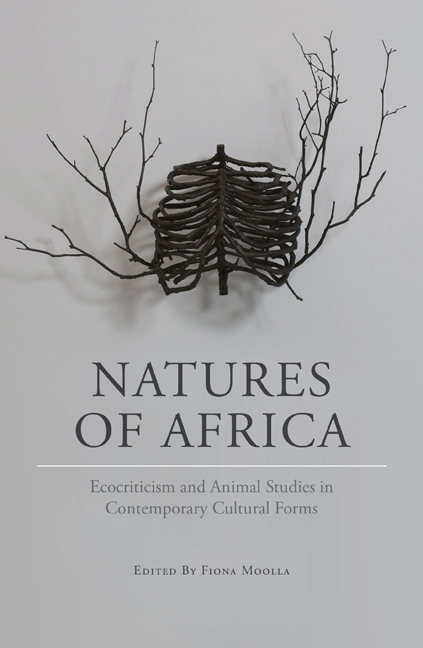Book contents
- Frontmatter
- Table of Contents
- Foreword
- Introduction
- 1 ‘Here is Some Baobab Leaf!’: Sunjata, Foodways and Biopiracy
- 2 Shona as a Land-Based Nature-Culture: A Study of the (Re)Construction of Shona Land Mythology in Popular Songs
- 3 The Environment as Significant Other: The Green Nature of Shona Indigenous Religion
- 4 Animal Oral Praise Poetry and the Samburu Desire to Survive
- 5 The Paradoxes of Voluntourism: Strategic Visual Tropes of the Natural on South African Voluntourism Websites
- 6 Towards an Ecocriticism in Africa: Literary Aesthetics in African Environmental Literature
- 7 Critical Intersections: Ecocriticism, Globalised Cities and African Narrative, with a Focus on K. Sello Duiker's Thirteen Cents
- 8 Navigating Gariep Country: Writing Nature-Culture in Borderline by William Dicey
- 9 Negotiating Identity in a Vanishing Geography: Home, Environment and Displacement in Helon Habila's Oil on Water
- 10 Human Masks? Animal Narrators in Patrice Nganang's Dog Days: An Animal Chronicle and Alain Mabanckou's Memoirs of a Porcupine
- 11 Nature, Animism and Humanity in Anglophone Nigerian Poetry
- 12 Animals, Nostalgia and Zimbabwe's Rural Landscape in the Poetry of Chenjerai Hove and Musaemura Zimunya
- About the authors
- Acknowledgements
- Notes
- Index
1 - ‘Here is Some Baobab Leaf!’: Sunjata, Foodways and Biopiracy
Published online by Cambridge University Press: 10 May 2018
- Frontmatter
- Table of Contents
- Foreword
- Introduction
- 1 ‘Here is Some Baobab Leaf!’: Sunjata, Foodways and Biopiracy
- 2 Shona as a Land-Based Nature-Culture: A Study of the (Re)Construction of Shona Land Mythology in Popular Songs
- 3 The Environment as Significant Other: The Green Nature of Shona Indigenous Religion
- 4 Animal Oral Praise Poetry and the Samburu Desire to Survive
- 5 The Paradoxes of Voluntourism: Strategic Visual Tropes of the Natural on South African Voluntourism Websites
- 6 Towards an Ecocriticism in Africa: Literary Aesthetics in African Environmental Literature
- 7 Critical Intersections: Ecocriticism, Globalised Cities and African Narrative, with a Focus on K. Sello Duiker's Thirteen Cents
- 8 Navigating Gariep Country: Writing Nature-Culture in Borderline by William Dicey
- 9 Negotiating Identity in a Vanishing Geography: Home, Environment and Displacement in Helon Habila's Oil on Water
- 10 Human Masks? Animal Narrators in Patrice Nganang's Dog Days: An Animal Chronicle and Alain Mabanckou's Memoirs of a Porcupine
- 11 Nature, Animism and Humanity in Anglophone Nigerian Poetry
- 12 Animals, Nostalgia and Zimbabwe's Rural Landscape in the Poetry of Chenjerai Hove and Musaemura Zimunya
- About the authors
- Acknowledgements
- Notes
- Index
Summary
Historian Felipe Fernández-Armesto writes that food is a ‘linkage in the chain of being: the substance of the eco-systems which human beings strive to dominate. Our most intimate contact with the natural environment occurs when we eat it’ (Fernández-Armesto 2001: xiii).
Food and foodways are the bridge between human culture and the natural environment. As Fernández-Armesto (2001: 5) puts it: ‘Culture began when the raw got cooked.’ The combination of the local ecosystem with the ways plants and animals were selectively bred, and the methods by which they were cooked create regional differences that become part of how people in those regions understand their culture. This chapter looks at the intersection of foodways studies and ecocriticism through one of the major oral epics of West Africa, Sunjata. Paying attention to food in African narratives – considering what is eaten and how it is grown or procured, and by whom – influences one's understanding of what is happening in the story. African storytellers, writers and film-makers use food and foodways as markers of independence, as symbols of cultural colonisation, and as signs of continued deprivations. Through foodways, one can glimpse famines, invasions and historical access to trade networks, and food can even serve as a vehicle for communication. Since the stories are not constructed in a vacuum, they can also reveal something about what food means in specific historical moments, in specific places and for specific populations.
In some respects, the diet of contemporary sub-Saharan Africa is remarkably similar across the region, despite the enormous differences in its bioregions. Much of this similarity emerged from colonisation, when European colonists attempted to turn most of the continent into vast plantations. To peel back the layers of colonial influence on the foods of the African continent, however, is difficult. Seamus Deane calls colonialism ‘a process of radical dispossession’ (Deane 1990: 10). Precolonial bioregionalism in agriculture was a victim of that dispossession. As Deane points out, a primary impulse after independence has been the attempt to repossess the history, cultures and languages stripped during the colonial era, because even if such attempts are futile, they are necessary steps out of the legacies of colonialism (Deane 1990: 11).
- Type
- Chapter
- Information
- Natures of AfricaEcocriticism and Animal Studies in Contemporary Cultural Forms, pp. 27 - 48Publisher: Wits University PressPrint publication year: 2016



